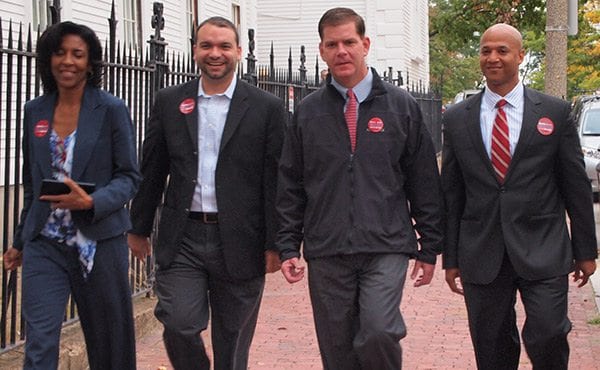Year in review: 2013 politics in Boston marked by multitude of campaigns


Mayor Thomas Menino’s March announcement that he would not seek office opened a floodgate of political ambition, as five city councilors, one state rep., three nonprofit leaders, a businessman, a district attorney and several perennial candidates joined a pool that thankfully winnowed down to 12.
It was no surprise then that five vacancies on the city council stoked more political ambition, drawing an even more unwieldy field of 19 candidates for the four at-large seats and dozens more contenders for district council seats.
Election Department staff, battered by a slew of special elections in 2012, plus the special election to fill the U.S. Senate seat formerly held by Secretary of State John Kerry and a state Senate race to fill the seat formerly held by Jack Hart – were now facing the prospect of one of the most multitudinous elections since the city scrapped its elected school committee in 1989.
Black, Latino and Asian candidates and voters had mixed luck with the year of political musical chairs.
On the positive side, state Rep. Linda Dorcena Forry, who represented the 12th Suffolk District in Dorchester and Mattapan, beat out South Boston state Rep. Nick Collins to win the First Suffolk Senate District seat formerly held by Hart.
And in the at-large race, Councilor Ayanna Pressley was the top vote-getter for the second consecutive election cycle. And political neophyte Michelle Wu scored a major victory, coming in second in the at-large race with strong support from black, Latino, Asian and progressive-leaning white voters.
On the negative side, none of the six candidates of color who entered the mayor’s race was able to secure enough votes to make it past the preliminary balloting.

Author: John BrewerMayoral candidates Bill Walczak, Mike Ross, Marty Walsh, John Barros, Charles Clemmons, Dan Conley, Charles Yancey, Felix G. Arroyo, Rob Consalvo and Charlotte Golar Richie during a candidates forum.
Post-election political pundits debated whether the sheer number of choices discouraged voters of color from coming to the polls, or the candidates themselves failed to catch fire with the public. In the end, voters in predominantly black and Latino precincts turned out at or below the city-wide average of 30 percent while voters in John Connolly’s West Roxbury base and Marty Walsh’s Cedar Grove stronghold approached 50 percent turnout.
While turnout was modest, candidates in the preliminary and final election campaigned heavily in communities of color, with walk-throughs in Dudley Station, visits to churches and pledges to diversify city government.
While turnout in the city’s black and Latino precincts remained average, Walsh and Connolly fought for their votes to the end, investing heavily in get-out-the vote machinery with dollars and volunteers.
Perhaps the most positive political story for people of color didn’t come through the ballot box and only lasted three months – the appointment of William “Mo” Cowan to fill the U.S. Senate seat formerly held by Kerry. Cowan became the second African American in Massachusetts history to serve in the Senate.
While the Massachusetts Black and Latino Caucus gained a seat in the state Senate with Dorcena Forry’s victory, they lost a seat in the House when neither Mary-dith Tuitt nor Stephanie Everett succeeded in their bids for the 12th Suffolk seat. Former Walsh aide Dan Cullinane secured the predominantly African American Mattapan/Dorchester seat in a decisive victory.
In the predominantly black and Latino Council District 5, formerly represented by Rob Consalvo, black candidates also failed to win in the preliminary. In the final election, Jean Claude Sannon lost to Timothy McCarthy by 10 percentage points.
After two special election-packed years, Boston Election Department workers may actually get a much-needed break. Democratic Party activists, on the other hand, can expect a full year, beginning with ward committee caucuses in Februrary and a June convention during which candidates for governor, lieutenant governor, attorney general and treasurer will be vying for the support of any delegate with a vote.
Come September, the voters will again be facing a long list of candidates for myriad offices. Of course Banner readers will know what to expect when they enter the ballot booth.







